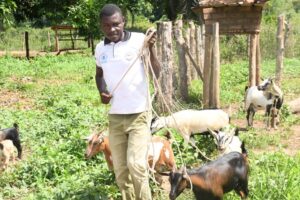By William Madouk
A dedicated farmer at Gitikri Boma, Western Equatoria State has become a living testament to the power of teamwork in unlocking success, in agribusiness.
Loice Wilson Mbiro, 31-year-old, mother of seven shared her story with No.1 Citizen Daily Newspaper. She analyzed the challenges she faced in cultivation, which resulted to poor harvests, insufficient to feed her family.
“I was only having small piece of land, I could cultivate and harvest one sack or two sacks of 50Kg,” she narrated.
However, Mbiro’s wheels of fortune turned on, when the World Food Programme (WFP) initiated a training program aimed at building the capacity of smallholder farmers and improving food security.
This initiative ignited a sense of empowerment among the farmers, who formed groups to engage in income-generating activities for self-reliance.
“I can produce bulky, and I will keep some in my store and sell some to pay my children school fees and medical bills,” she proudly stated.
“I am now able to get 39 sacks of 50 Kgs, which is helping me and change my life.”
Mbiro urged other women to embrace teamwork if they wished to benefit and achieve success.
According to the WFP, the Smallholder Agriculture Market Support (SAMS) initiative aims to equip smallholder farmers with value-adding techniques and post-harvest methods to enhance productivity for local consumption.
Mbiro also highlighted how she could now afford essential items for her family, such as mattresses, and earn approximately SSP3 million from selling her maize grains or groundnuts.
Another farmer, Amos Valerio, a member of the Gitikiri Farmers’ Cooperative Society, shared his success story, attributing his improved harvest of 52 bags to the capacity-building training provided by WFP.
“The production we have been harvesting was very poor because nobody dire to buy from us,” he explained.
“So, every harvest we produced were spoiled but now due to WFP help via Star Trust Organization (STO) we produce and then WFP come and buy from us. That is how we are managing,” Valerio added
Valerio expressed gratitude for WFP’s program of purchasing crops from local farmers, which has empowered them economically.

He revealed that with his profits, he was able to purchase a motorbike, pigs, and goats.
With a smile on his face, Valerio added, “I also have plan to build a concert house, which is now in the process.”
Valerio stated that he used to get SSP300, 000, however now he earns roughly over SSP2.5 million.
So far, WFP has procured 650 metric tons of white maize from farmers in Western Equatoria State for school feeding programs and humanitarian aid.
To provide storage facilities for the crops, WFP, with support from the German government through KFW, has constructed the Yambio Farmers Agribusiness YAFA Cooperative warehouse.
Valerio urged WFP and its partners to construct additional warehouses for farmers and provide grinding machines.
He also expressed concerns about the lack of transportation means and accessible roads connecting to other states.
“We have the availability of the commodities in the store but how to transport it to the towns is a big challenge because we don’t have trucks,” he lamented.
Anthony Ezekiel, the chairperson of YAFA, explained that the cooperative was established in the early 2000s and currently has around 700 registered farmers, with 40 active members.
“This cooperative was formed with an aim to help our farmers coordinate our issues and even mobilize the farmers to work in the group,” Ezekiel explained.
“This cooperative is to look for the market for the farmers produces [crops],” he added.
Yona Robert Mark [pictured], the State Minister of Cooperative and Rural Development in Western Equatoria State said the lives of farmers in the State have changed greatly since the World Food Programme started buying the harvests from the farmers
“Currently, WFP can purchase more the 455 metric tons from smallholder’s farmers and also from Cooperatives in WES mostly white maize from small farmers and cooperatives
“This is a very great achievement to our farmers and small farmer’s holders in WES.”




